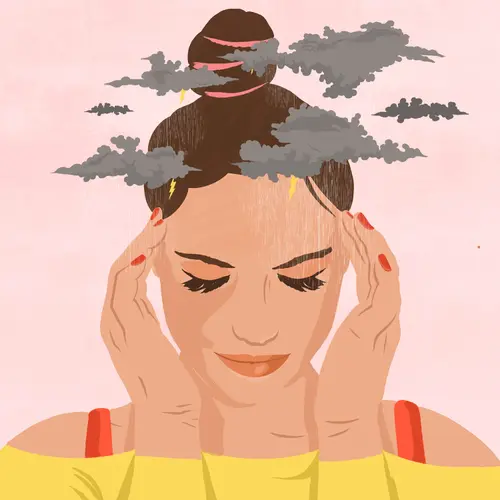Tracing the Roots of Your Migraine Family Tree

Hide Video Transcript
Video Transcript
ROBIN ROBERTS
Imagine if your entire immediate family and most of your relatives suffer from migraines. For people like the young woman you're about to meet, this is a reality. Her family story sheds a light on the inheritability of migraines, and how scientists can harness our genetic footprint to help find treatments for the pain. KATE
Migraines have completely controlled my life. I hate to say it, but it's true. Everything I do is planned around migraines. ROBIN ROBERTS
23-year-old Kate is not like most college students enjoying the freedom and fun of campus life, because on most days when she's at school, and even when she's at home, she is in pain. KATE
If I go out, I have to-- very carefully, I have water. I have food. I make sure that I have rested beforehand and I have an escape route if I start to feel terrible. And I don't really go out that much because it's hard. It's hard to be around a lot of people. So I'm very reclusive. ROBIN ROBERTS
So it's impacted-- had an effect on your relationships and friendships. KATE
Yeah. Yeah. It's too difficult to go to a party. That's, like, just not fun for me. So I spend a lot of time by myself. ROBIN ROBERTS
Kate's struggle with migraines is one her mother Jill knows all too well because migraine runs in her family. JILL
I have migraine. My mom has migraine. From what I understand-- I never met her, but her mom used to say, I have a sick headache, and would retreat. Now we know that that was kind of code for migraine. ROBIN ROBERTS
What's more, Kate's other grandmother, her father, brother-- COUSIN: I feel like a slight throbbing and sometimes I'll ignore it, but I know it's going to get worse if I-- ROBIN ROBERTS: --and many cousins also have suffered from migraines. Her father Rick says it was worse for him when he was a teenager. RICK
Tylenol had just come out. So I don't know what year that was, but that was like a miracle. Great. Now there's something more than just aspirin that I can take. And I remember that being sort of the promised land, if you will. ROBIN ROBERTS
But for Kate, there has been no medication or treatment that has helped ease the pain. Her childhood was marked by frequent visits to neurologists, migraine specialists, and hospitals, desperate to find relief. JILL: My 17-year-old, 18-year-old, 20-year-old, for days and days in the dark with her head on the pillow, saying, "I'm dying." And me, just all I can do is kind of lay down next to her, hold her, rub her head, give her an ice pack. There's nothing I can do. That's hard. ROBIN ROBERTS
Today, Kate says she lives with migraine pain 24/7. KATE
I guess we've come to describe it as like a dimmer switch. So it goes up. Sometimes it's worse. Sometimes it's better. But it's always on. ROBIN ROBERTS
Always on. How do you deal with it? How do you cope with that? KATE
I don't know. I'm-- I guess I chose one thing to focus on, which for me is school, because I like learning. So I cope by being really good at school and sort of forgetting about everything else. ROBIN ROBERTS: Kate's quick trips to and from school most often leave her recuperating at home in the dark, unable to get out of bed. So why are Kate's symptoms so much more severe than the rest of her family's? DR. DAVID DODICK: A recent publication actually looking at the blood of over 375,000 people, of which tens of thousands had migraine, actually found that there were 38 genes-- variations in 38 genes that increase the risk of developing migraine. She may have inherited variations in multiple genes which, when added together, allowed the disease to be expressed in a much more severe way. It is the perfect storm. ROBIN ROBERTS
Dr. Dodick says a child has a 50% chance of inheriting migraine if one parent has the familial form of the disease. That jumps to as high as a 100% chance if both parents have it, as in Kate's case. How do you deal with people who don't understand? If you have-- it's an illness, and any other illness, if you were going through cancer like I did and lost my hair, people could understand that. But there seems to be, as your mother was saying earlier, oh, come on. Just-- JILL
Tough it out. ROBIN ROBERTS
Tough it out. Tough it out. So how do you handle it when-- and make people understand, no, it's not that way. KATE
Well, honestly, I don't really tell people. Because I can tell when somebody thinks I'm lying, and I don't want to subject myself to that. DR. DAVID DODICK
Migraine right now is synonymous in the public with a headache. OK, maybe it's a bad headache, but it's just a headache. Well, it's so much more than a headache. It's an inherited neurological disease with functional and structural consequences on the organ that's most affected, which is the brain. ROBIN ROBERTS
For now, Kate is focusing on something else she says she has inherited from her family-- resilience. Buoyed by their support and love, she graduates from college this year with a degree in psychology. She has already interned with a neurologist, helping research and write papers on migraine. RICK
What kind of amazes me about her is that most of her doctors will say people in her condition don't get out of bed. And yet Kate is, as much as she suffers, has managed to do a lot. ROBIN ROBERTS
What is your message for somebody seeing this who is walking in similar shoes as you? KATE
Don't let other people's impression of your illness define you. Because I've really struggled with that. So don't let other people define your experience. And to just keep going. Just keep going. ROBIN ROBERTS
So how well are you managing your migraines? Go to webmd.com/migraine to take an assessment. You'll get personalized results with strategies to help you live better. 